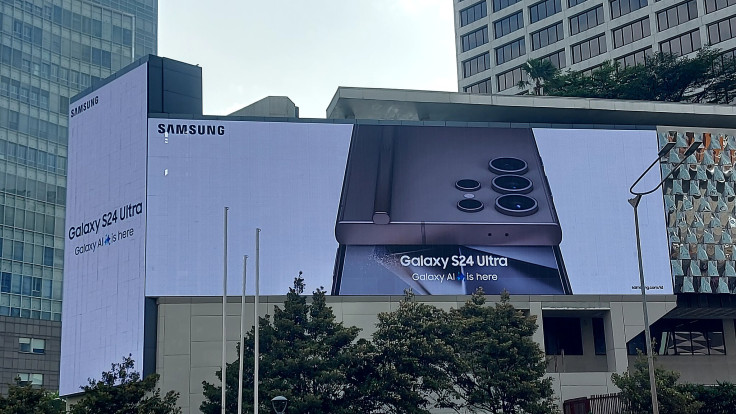Chinese Consumers Unimpressed By Baidu AI On Galaxy S24
Social media in China is buzzing with dissatisfaction over Baidu's search capabilities on the Galaxy S24, raising concerns about Samsung's China strategy.

Chinese consumers claim that the Baidu search functionality on the Galaxy S24 series fails to meet the standards of Google's search, raising concerns about Samsung's strategy in the Chinese market.
As part of a recently announced strategic partnership, Samsung's China website confirmed that the company will integrate Baidu's Ernie Bot and search engine into its Galaxy S24 series smartphones. However, it looks like the move did not spark a lot of excitement among Chinese consumers.
🤝 Samsung-Baidu Partnership Unveiled
— Meganet-Amway (@Meganet_Amway) February 5, 2024
📱 Galaxy S24 in China: AI collaboration for tailored features.
🚀 Innovation Goals: Real-time call translation & Circle to Search.
🤔 Consumer Feedback: Mixed reviews on AI functionalities.
🌏 Global Disparity: Users note differences in…
Most AI features tailored for the Chinese market on the Galaxy S24 resemble those offered by Google's Gemini AI in the global version. However, a considerable number of Chinese users on Weibo are expressing dissatisfaction with the local Galaxy S24's search capabilities compared to the international version.
Can Samsung's China strategy succeed with Baidu's AI features?
"The overseas version is a completely different world than the mainland version," said Weibo user Sun Weilun. The user claimed they had visited a Samsung store in Hong Kong to test different models.
According to a report by The Korea Times, the user found that the Baidu-powered "Circle to Search" feature provided much fewer results compared to the overseas version powered by Google.
Richard Zhang, a 30-year-old Beijing resident, said he plans to get his hands on an overseas version of the Galaxy S24 for a superior AI experience. "I started considering this after I saw the [mainland] system recognizes Samsung's own phones as other brands," Zhang said.
Samsung to integrate Baidu’s AI model into new Galaxy S24 handsets, as mainland Chinese rivals push new smartphones with similar tech pic.twitter.com/X4l0DKToSt
— V.O.H (@Knot73211261) January 27, 2024
Still, Baidu's position as a leader in Chinese AI development makes it a strong partner for Samsung's China-specific features. To those unaware, Baidu was the first major tech company in China to launch an AI chatbot, Ernie Bot in March 2023.
Last September, the Chinese internet company released the latest version of its LLM, Ernie 4.0, which it said is as good as OpenAI's GPT-4 in generalised abilities.
The partnership with Baidu isn't likely to help Samsung make a major change in the Chinese market, where its share dropped from 20 per cent to less than 1 per cent over the past decade.
The Korean brand was already facing the pressure of competing with domestic vendors, but now the battle has extended to the AI ecosystems. Notably, major Chinese smartphone makers including Huawei, Oppo and Vivo are either gearing up to release their own LLMs or integrate generative AI features in their new phones.
"Within the Chinese market, AI alone is unlikely to trigger immediate changes," Ivan Lam, a senior analyst for Counterpoint Research said. Lam also noted that the partnership "signifies Samsung's dedication to long-term, consistent operations in China".
Moreover, Lam pointed out that there aren't any major influencing factors that suggest a "significant shift in Samsung's market standing in China".
In China, Samsung is offering the Galaxy S24 and S24 Plus for 500 yuan (£55.66) to 800 yuan (£88.80), more expensive than last year's Galaxy S23 and S23 Plus models, Peng Peng, an analyst for wireless smartphone strategies at TechInsights noted. In the US, the company maintained price tags for the latest series and reduced their prices in Europe.
"It seems Samsung is not intensively competing in terms of value for money in the world's largest smartphone market with domestic vendors," Peng said. While the Baidu partnership raises questions about Samsung's strategy, another executive statement has sparked a similar debate.
Samsung executive claims there are no real pictures
Samsung EVP Patrick Chomet told TechRadar there is no such thing as a real picture. Apparently, modern cameras use sensors and advanced algorithms to recreate pictures.
Referring to a video YouTuber Marques Brownlee made about the moon pictures captured by Samsung's high-end smartphones, the top executive asked what a real picture is.
S24 Ultra at night. #GalaxyS24 #s24ultra pic.twitter.com/GxXEv8RR5n
— Julian (@timjulian_brd) January 27, 2024
"There was a very nice video by Marques Brownlee last year on the moon picture. Everyone was like, 'Is it fake? Is it not fake?' There was a debate around what constitutes a real picture," he said.
"And actually, there is no such thing as a real picture. As soon as you have sensors to capture something, you reproduce [what you're seeing], and it doesn't mean anything. There is no real picture.
"You can try to define a real picture by saying, 'I took that picture,' but if you used AI to optimize the zoom, the autofocus, and the scene – is it real? Or is it all filters? There is no real picture, full stop," Chomet added.
© Copyright IBTimes 2025. All rights reserved.






















